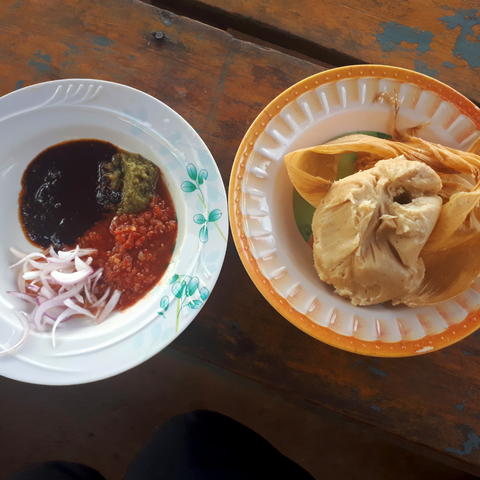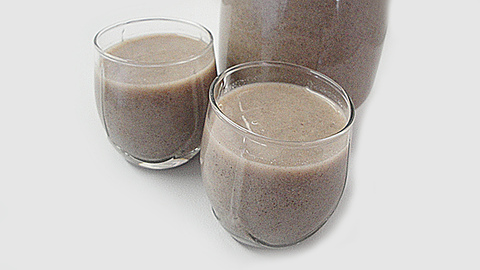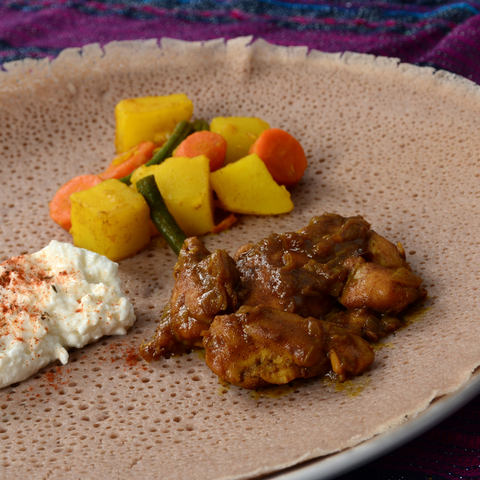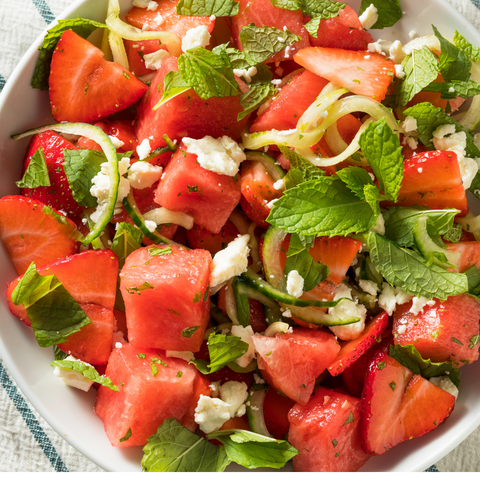Incorporating health foods into your diet is crucial for maintaining a healthy lifestyle and promoting longevity. The foods we eat have a significant impact on our overall health, and consuming nutrient-dense, whole foods can provide numerous health benefits.

Backed Sweet potato with avocado salad: Image from Canva
In this article, we will explore the various health foods that you can incorporate into your diet to promote longevity and overall well-being. By adding these foods to your meals and snacks, you can increase your lifespan and enjoy a healthier, more fulfilling life. So, let's dive in and discover the health foods that can help you live your best life!
Nutrient-dense Foods
- Definition of nutrient-dense foods
- Examples of nutrient-dense foods such as leafy greens, berries, nuts, and seeds
- Importance of including these foods in the diet for optimal health and longevity
Nutrient-dense foods are foods that are rich in nutrients, including vitamins, minerals, fiber, and antioxidants, while also being relatively low in calories. These foods provide a wide range of health benefits, including reducing the risk of chronic diseases such as heart disease, diabetes, and cancer.
Examples of nutrient-dense foods include:
- Leafy greens like Moringa leaves and Kale,
- Marula fruit & Baobab fruit pulp,
- Bambara nuts and African walnuts, and
- Seeds like Fonio seeds and Pumpkin seeds.
Incorporating these foods into your diet can be as simple as adding a spoonful of Moringa or Baobab fruit powder morning oatmeal or smoothie, tossing some Pumpkin seeds into your Kale salad, or snacking on a handful of these nuts or seeds.
Not only do these foods provide important nutrients, but they can also help you feel full and satisfied, making it easier to maintain a healthy weight. So, aim to incorporate a variety of nutrient-dense foods into your meals and snacks for optimal health and longevity.
Superfoods
Superfoods are nutrient-dense foods that are particularly high in health-promoting compounds such as antioxidants, vitamins, and minerals. They come from different parts of the world just as acai berries from the Amazon rainforest, Baobab fruit comes from sub-Saharan Africa. These foods have been linked to various health benefits, including reducing inflammation, improving brain function, and lowering the risk of chronic diseases.
You can find a list of The Top 10 African Superfoods You Need to Add to Your Diet here.
Incorporating superfoods into your diet can be as simple as adding them to smoothies, salads, or using them as seasonings for your meals. However, it's important to keep in mind that while superfoods can provide numerous health benefits, they should not be considered a replacement for a well-balanced diet rich in a variety of fruits, vegetables, whole grains, and lean proteins.
Plant-based Protein Sources
Plant-based proteins are an excellent source of nutrients, including fiber, vitamins, and minerals, and are often lower in saturated fat than animal-based proteins. They have been linked to numerous health benefits, including reducing the risk of heart disease, diabetes, and certain cancers.
Some examples of African plant-based proteins include:
-
Legumes:
- Cowpeas (Black-eyed Peas): Rich in protein, fiber, and various vitamins and minerals.
- Lentils: A good source of protein, iron, and folate.
- Pigeon Peas: High in protein, dietary fiber, and vitamins.
-
Grains:
- Sorghum: Contains protein, fiber, and various nutrients.
- Fonio: Provides protein, essential amino acids, and minerals.
- Quinoa (cultivated in some African regions): A complete protein source with all essential amino acids.
-
Nuts and Seeds:
- Groundnuts (Peanuts): High in protein, healthy fats, and various vitamins and minerals.
- Bambara nuts: Good source of protein, healthy fats, and minerals.
- Sunflower Seeds: Contain protein, healthy fats, and vitamin E.
-
Leafy Greens and Vegetables:
- Moringa: Not only the seeds but also the leaves are rich in protein, vitamins, and minerals.
- Okra: Contains protein, fiber, and various nutrients.
- Amaranth Greens: Good source of protein, iron, and calcium.
-
Tubers and Root Vegetables:
- Yams: Provide a moderate amount of protein along with carbohydrates and fiber.
- Cassava: Contains a small amount of protein along with carbohydrates.
-
Wild Edibles:
- Baobab Leaves: High in protein, vitamins, and minerals.
- Wild Spinach: Provides protein, iron, and other nutrients.
Incorporating plant-based proteins into your diet can be as simple as swapping out meat for legumes in your chili or adding Bamabra nuts to your stir-fry. It's important to ensure that you are getting enough protein in your diet, as protein is essential for building and repairing tissues in the body. Aim to include a variety of plant-based proteins in your meals to ensure that you are getting all the essential amino acids your body needs.

Bambara nut salad: Image from Biz Innovation Zimbabwe
In addition to being a healthy protein source, plant-based proteins are also more sustainable for the environment, as they require fewer resources to produce than animal-based proteins. By incorporating more plant-based proteins into your diet, you can promote your own health while also doing your part for the planet.
Healthy Fats
Healthy fats are an essential part of a healthy diet and have been linked to numerous health benefits, including reducing the risk of heart disease, stroke, and cognitive decline. Unlike saturated and trans fats, which have been linked to negative health outcomes, healthy fats can help improve cholesterol levels and provide essential nutrients like omega-3 fatty acids.
Here are some examples of African sources of healthy fats:
-
Avocado:
- Rich in monounsaturated fats.
- Contains vitamins, minerals, and antioxidants.
-
Palm Oil:
- Contains a mix of saturated and unsaturated fats.
- Rich in vitamin E and antioxidants.
-
Shea Butter:
- Primarily composed of stearic and oleic acids.
- Used in cooking and skincare.
-
Groundnuts (Peanuts):
- High in monounsaturated and polyunsaturated fats.
- Good source of protein, fiber, and various nutrients.
-
Sesame Oil:
- Derived from sesame seeds.
- Contains healthy fats and antioxidants.
-
Coconut:
- Coconut Oil: High in saturated fats but with potential health benefits.
- Coconut Flesh: Provides healthy fats along with fiber and nutrients.
-
Sunflower Oil:
- Extracted from sunflower seeds.
- Contains polyunsaturated fats and vitamin E.
-
Baobab Oil:
- Extracted from the seeds of the baobab fruit.
- Contains healthy fats and antioxidants.
-
Hemp Seed Oil:
- Extracted from hemp seeds.
- Contains a balanced ratio of omega-3 and omega-6 fatty acids.
-
Fish (depending on region):
- Fish such as mackerel, sardines, and tilapia are good sources of healthy fats like omega-3 fatty acids.
These fats can be incorporated into a variety of dishes, from salads and stir-fries to baked goods and smoothies.

Plantain fried in palm oil
It's important to note that while healthy fats can be beneficial in moderation, they are also high in calories. Aim to incorporate healthy fats into your diet in moderation and in place of less healthy fats like saturated and trans fats. Try experimenting with different types of healthy fats to find ones that you enjoy and that work well for your body.
Antioxidant-rich Foods
Antioxidants are compounds that help protect the body from damage caused by harmful molecules called free radicals. Free radicals can cause oxidative stress, which has been linked to numerous health problems, including cancer, heart disease, and Alzheimer's disease. Incorporating antioxidant-rich foods into your diet can help reduce the risk of these health problems and promote overall well-being.
It's important to note that while antioxidant-rich foods like blueberries can be beneficial, they should not be relied upon as a sole source of antioxidants. Many herbal teas are rich sources of antioxidants. Examples include African Rooibos tea and Zumbani tea. They can be easily incorporated into a variety of dishes, from smoothies and salad dressings to baked goods.
Probiotics And Fermented Foods
Fermented foods have been consumed for centuries and have been linked to numerous health benefits, including improved digestion, immune function, and mental health. Fermentation is a process that involves the breakdown of carbohydrates by bacteria or yeast, which results in the production of beneficial compounds like probiotics and organic acids.
Incorporating fermented foods into your diet can be as simple as having a serving of yogurt with your breakfast or adding some kimchi to your stir-fry. It's important to note that not all fermented foods are created equal, and some may be higher in added sugars or sodium. Aim to choose fermented foods that are low in added sugars and sodium and are made with simple, whole food ingredients.
Examples of fermented foods include Greek yogurt, sauerkraut from Germany, kimchi from Korea, and miso from Japan. These foods are rich in probiotics, which are live bacteria that can help promote a healthy gut microbiome. A healthy gut microbiome has been linked to numerous health benefits, including improved digestion, immune function, and mental health.
With fermented African foods, they can take the form of liquids such as Zimbabwean Mahewu, or Ghanain dumplings such as Kenkey, or Ethiopian dry bread like Injera. Mahewu is made from fermenting cereals like maize or millet or sorghum.
Ghanaian Kenkey
To make Kenkey, maize grains are soaked in water for approximately one week, after which they are ground into a fine powder and mixed with water to form a dough. This dough is then left to ferment for a duration of four to seven days. Once the fermentation process is complete, a portion of the dough is cooked to produce the popular Ghanain dish Kenkey.
Here are some health benefits of Kenkey include:
- Kenkey is made up of complex carbohydrates, low protein, low fat and high fiber content. This helps with digestion because of its high level of fiber which aids in digestion and regulates blood sugar. It also protects one from constipation and hemorrhoids.
- It is rich in phosphorus, manganese, zinc, calcium, magnesium, selenium and iron.
- It has antioxidants and phytochemicals like lutein, zeaxanthin, anthocyanin, caffeic acid, vanillic acid, protocatechuic acid, syringic acid, beta-carotene, coumaric acid and ferulic acid. Some of these, protect the body from heart disease, diabetes, cancer and improve eye health.
- Reduced blood cholesterol levels.

Ghanaian Kenkey: Image from Canva
Zimbabwean Mahewu
Mahewu is a beverage that boasts a high carbohydrate content while containing low-quality protein. This unique combination makes it an excellent source of energy for those seeking to fuel their bodies with quick and efficient energy. Its high carbohydrate content provides a rapid source of glucose to the body while the low-quality protein offers additional sustenance to maintain energy levels.
Some of the nutritional benefits of Mahewu include:
- Enhanced absorption of nutrients especially the B-vitamins (Niacin, Pantothenic Acid, Folic Acid, B1, B2, B6, B12)
- Improved digestion: Some studies suggest that the healthy bacteria found in Mahewu help to prevent constipation.
- In traditional medicine, Mahewu is used to increase milk supply in breastfeeding mothers.

Zimbabwean Mahewu: Image from Zimbo Kitchen
Ethiopian Injera
Injera is a sour fermented pancake-like flatbread with a slightly spongy texture, traditionally made of teff flour.

Adding fermented foods to your diet can be a simple and delicious way to promote gut health and overall well-being. Try experimenting with different types of fermented foods to find ones that you enjoy and that work well for your body.
Hydration
Staying hydrated is crucial for overall health and well-being. Water makes up a significant portion of our bodies and helps regulate body temperature, cushion and lubricate joints, and transport nutrients and waste throughout the body.
The amount of water needed for each individual varies based on factors such as age, weight, and activity level, but a general guideline is to drink at least 8 cups (64 ounces) of water per day. Other sources of hydration include herbal tea, fruit-infused water, and low-sugar sports drinks.

Watermelon salad: Image from Canva
It's important to note that staying hydrated does not mean only drinking water. Many foods, such as watermelon and vegetables like celery, contain high amounts of water and can help contribute to overall hydration levels.
Incorporating hydration into your daily routine can be as simple as carrying a refillable water bottle with you. Additionally, incorporating hydrating foods into your diet, such as watermelon, cucumbers, and oranges, can also help contribute to overall hydration levels.
Moderation And Balance
While incorporating healthy foods into your diet can be beneficial for overall health and well-being, it's important to remember the importance of moderation and balance. Eating a varied and balanced diet that includes a mix of all food groups is key to achieving optimal health.
Moderation means enjoying all foods in moderation, including those that may not be considered "healthy." It's important to allow yourself the flexibility to enjoy occasional treats or indulgences, while still prioritizing healthy, nutrient-dense foods as the majority of your diet.

Image from Unsplash
Balance means eating a variety of foods from all food groups, including fruits and vegetables, whole grains, lean proteins, and healthy fats. This ensures that your body is receiving all the essential nutrients it needs to function properly. Planning meals ahead of time, practicing mindful eating, and being aware of portion sizes.
Additionally, seeking guidance from a registered dietitian or healthcare professional can help ensure that your diet is well-balanced and meets your individual nutritional needs.
Conclusion
Incorporating health foods into your diet is a great way to support optimal health and longevity. By focusing on nutrient-dense foods, such as fruits and vegetables, whole grains, lean proteins, healthy fats, and antioxidant-rich foods, you can provide your body with the essential nutrients it needs to function properly and ward off disease.
In addition, staying hydrated and incorporating moderation and balance into your diet are also important components of a healthy lifestyle. By following these simple guidelines, you can set yourself up for long-term health and well-being, improved physical, mental and emotional well-being.
Remember, healthy eating is not about restriction or deprivation, but rather about finding a balance that works for your individual needs and preferences. Don't be afraid to experiment with new foods and recipes, and seek guidance from a registered dietitian or healthcare professional if needed. With time and dedication, you can achieve a healthy and fulfilling relationship with food that supports optimal health and longevity.
